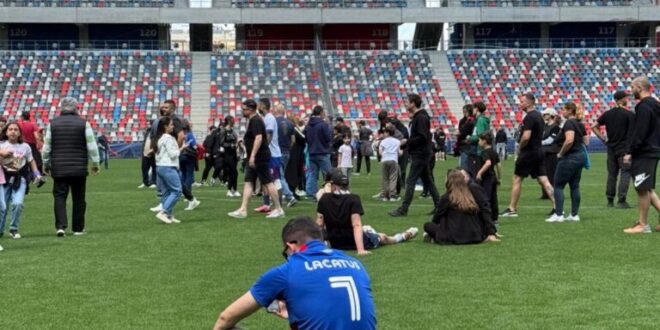You might recall the 1986 European Cup Final held in Seville. Barcelona was beaten in a dramatic penalty shootout.
Steaua Bucharest was the team that stunned the world on that night. A Romanian club founded in 1947, it has a rich and long history.
Steaua reached the semi-finals in 1988 and was a regular in the Champions League groups throughout the 1990s.
Steaua’s turbulent modern era
Steaua Bucharest, Romania has seen turbulent times over the last few years.
While international media often refer to a team called “Steaua” — actually FCSB — the real Steaua is stuck in Romania’s second division. Meanwhile, the top-flight club — which reached the Europa League round of 16 this season — continues to exploit Steaua’s identity, despite Romanian court rulings that prohibit it.
Credit: AS 47
Steaua, owned by Romania’s Ministry of National Defence, hosted CSM Reșița in front of 5,000–6,000 fans last weekend. A disappointing 0–2 defeat meant they missed out on finishing first in the league, but still ended the season second — ahead of several clubs with larger budgets (Steaua’s football section operates with just €1.6 million).
Normalerweise, this would result in promotion. In Steaua’s situation, however, this result will not.
The 2003 Takeover has changed Romanian Football
To better understand this strange situation, let’s go back to the year 2003 when Gigi becali first appeared on the scene. A controversial figure who made his fortune through shady business deals with the state in the 1990s, Becali — later convicted and known for homophobic and xenophobic outbursts — claimed to have bought Steaua.
He simply transferred the players to another company, and with the help of the football authorities registered the new team in the top division of Romania midway through the year.
This was a reflection of the widespread illegal activity in Romania at the beginning of 2000s. Steaua was affected by these practices because it is a state owned institution. For Becali, whose ambitions included a political career and widespread media attention, “owning” Steaua was a dream — a fast track to fame and power as the financier of Eastern Europe’s biggest football club.
Justice has been served but it is a little late
It worked for more than a decade. The club was known as Steaua, had a logo and name that attracted a lot of media attention, and developed a large fan base. The truth came to light eventually.
After many years of legal battles, the Romanian justice system ruled that FCSB used Steaua’s name, logo, and achievements in an illegal manner. They were returned to Ministry’s club which, in 2017, reactivated the football section and started again at the 4th division.
But the damage has already been done. Justice was only served half-heartedly. FCSB was still in the first division even after the courts confirmed that the club had been established in 2003, and it did not have any legal ties with Steaua. FCSB was fraudulently registered for the 2002/03 football season. However, they retained their place in the first division and continued to use Steaua’s identity.
Many fans stuck with FCSB, and younger generations support it as though it were the original Steaua — a consequence of media dominance, selective truths, and continued domestic and European results.
The Steaua Paradox: Fit for Europe and banned at home
Steaua, meanwhile, reached Liga 2 by 2021 after a grueling climb through lower-league football. They’ve been denied promotion to Liga 1 on two occasions since then. Both times, it was because they were state-funded.
While Romania’s sports law prohibits state ownership for teams playing in the First Division, a loophole allows many top-tier clubs — indirectly funded by city halls — to qualify as “private associations” and bypass regulations. Steaua, a military team, faces rejection even though UEFA permits its participation in European tournaments. Steaua would be able to compete in the Europa League, if they won the Romanian Cup. Despite its current organizational structure, Steaua cannot be promoted.

Credit: AS 47
After the match against Reșița, hundreds of supporters stormed the pitch, demanding the Romanian Football Federation allow Steaua to be promoted. Their frustration is mounting — not only because FCSB continues to use Steaua’s identity illegally, but also because this prevents the club from reconnecting with its vast, dormant fan base. Steaua’s promotion would enable it to re-emerge in the national scene, reuniting them with the hundreds of thousands fans who have no reason to support a team of second tier.
Read here more sports news.
 Costa News Spain Breaking News | English News in Spain.
Costa News Spain Breaking News | English News in Spain.







